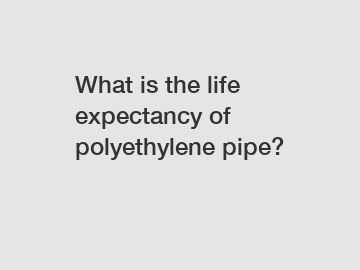What is the life expectancy of polyethylene pipe?
The life expectancy of polyethylene pipe is approximately 50 to 100 years, making it a durable and long-lasting solution for various applications. Polyethylene pipe is widely used in industries such as water distribution, gas transportation, sewage systems, and irrigation due to its exceptional performance and resistance to environmental factors. .
The longevity of polyethylene pipe can be attributed to its unique properties and the material's resistance to degradation. Polyethylene is known for its high density and molecular structure, which provides excellent resistance to chemicals, weathering, and aging. This makes it suitable for both underground and aboveground installations, ensuring consistent performance over an extended period.
To further analyze the life expectancy of polyethylene pipe, numerous research studies and field observations have been conducted. These have consistently shown the long-term durability and reliability of polyethylene pipe systems. In a study conducted by the Plastics Pipe Institute, it was found that the average service life of polyethylene pipes in the water industry was estimated to be between 70 to 100 years. .

The research also highlighted that the life expectancy of polyethylene pipe is influenced by various factors such as installation practices, environmental conditions, and the specific application. Proper installation techniques, including using qualified personnel and following industry standards, play a crucial role in ensuring the longevity of the pipe. Additionally, the use of appropriate fittings and jointing methods further enhances the overall performance and extends the life expectancy of the system.
The significance of the extended life expectancy of polyethylene pipe is manifold. Firstly, it provides significant cost savings compared to other materials. The long lifespan eliminates the need for frequent replacements and repairs, leading to reduced maintenance expenses. Additionally, the durability of polyethylene pipe eliminates the risk of costly leaks or failures, ensuring a continuous supply of water, gas, or other fluids.
Furthermore, the extended life expectancy of polyethylene pipe has a positive environmental impact. As a sustainable material, polyethylene is recyclable and has a low carbon footprint. The use of long-lasting polyethylene pipe reduces waste generation and the demand for natural resources.
In conclusion, the life expectancy of polyethylene pipe ranges from 50 to 100 years, making it a highly durable and reliable solution for various industries. Through its unique properties and resistance to degradation, polyethylene pipe systems consistently demonstrate longevity and performance. Understanding the factors that influence its lifespan, such as proper installation practices, allows for maximizing the potential of this versatile material. The extended life expectancy of polyethylene pipe not only provides cost savings but also contributes to environmental sustainability.
Are you interested in learning more about pipe floats for sale, hose floats suppliers, buy hdpe pipe floats? Contact us today to secure an expert consultation!

Comments
0